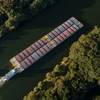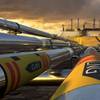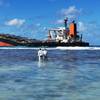Wärtsilä Corporation has received the first order for Wärtsilä 32DF marine engines. PGS Production in Norway has contracted for two Wärtsilä 18V32DF engines to be installed in the FPSO (floating, production, storage and offloading) vessel "Petrojarl I". The two engines, each developing 3,720 kW at 720 rpm, will be supplied as complete generating sets. They will burn wellhead gas. Built specifically as an FPSO vessel for North Sea service in 1986, the "Petrojarl 1" has been fitted with various additional equipment over the years.
The two Wärtsilä-engined sets will therefore add necessary electricity generating capacity. They are currently being installed during a planned major drydocking before the vessel takes up a three-year contract on the Glitne field in the North Sea. The vessel will return to service in summer 2001, with the first oil expected to be produced at the end of July.
The choice of engines for "Petrojarl I" was influenced by the fact that the vessel will operate under Norwegian jurisdiction where a carbon dioxide tax is levied on power production in the offshore sector. The efficiency of the power plant thus has a significant impact on the operation costs of the oil fields. As the operator's requirements also include low NOx emissions, the Wärtsilä 32DF engine emerged as the first choice for this installation.
PGS Production already employs Wärtsilä GD (gas-diesel) engines on two other FPSO vessels. The "Petrojarl Foinaven" has four Wärtsilä 16V32GD engines and four Wärtsilä 18V32GD engines, while the "Varg" has four Wärtsilä 18V32GD engines. These have all given good service experience which has contributed to the decision to order the Wärtsilä 32DF engines for the "Petrojarl I".
The Wärtsilä 32DF engine type provides an alternative to the Wärtsilä 32GD type for using gaseous fuels in marine installations. The 32GD type has been highly successful in the offshore market with 38 engines in service and on order. The first Wärtsilä 32GD engines were delivered in 1989 and individual engines have more than 70,000 running hours.
The Wärtsilä 32DF engine has been introduced to marine applications to meet the requirements of a new safety class for installations with a gas pressure of less than 10 bar in a single-pipe arrangement. Class approval in principal for this safety concept is now in hand and a class-approved control system based on the Wärtsilä WECS 8000 electronic control system has been introduced on the Wärtsilä 32DF marine engine.
An important contribution to satisfactory running of the Wärtsilä 32DF engine comes from the application of full electronic control. When running on gas with a premixed air-gas mixture and micro-pilot injection, the combustion must be closely controlled to prevent knocking and misfiring. The Wärtsilä WECS 8000 control system provides control of the air-gas ratio, and the quantity and timing of the pilot fuel injection to keep every cylinder at the correct operating point between the knock and misfiring limits. The pilot fuel system is a common-rail system with one engine-mounted high-pressure pump supplying diesel oil to the injection valves at a constant pressure of 900 bar. The gas fuel is supplied to the engine at a pressure of less than four bar.
Subscribe for
Maritime Reporter E-News
Maritime Reporter E-News is the maritime industry's largest circulation and most authoritative ENews Service, delivered to your Email five times per week










